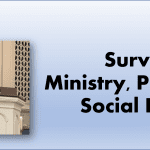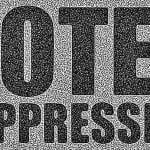Read against the background of Mark 1:21-28 where Jesus expels and unclean spirit, the poetry of Amanda Gorman at the Inauguration was cathartic. At once astonishing, prophetic, and inspiring, her poem reminds us that words have power to expel the demonic. Just like Jesus.

Text: Mark 1:21-28
“Just then there was in their synagogue a man with an unclean spirit.” (Mark 1:23)
Let’s take a moment with this term, “unclean spirit.” The word for “unclean” in the Greek is akáthartos.
You may recognize the word catharsis in there.
A catharsis is when something is cleansed, when all that has been pent up and festering is suddenly released. A good cry can be cathartic. Dancing can be cathartic. Belting out a song or putting pen to paper to purge one’s spirit can be cathartic.
But the word akáthartos has that little “a” at the beginning. This is a negating prefix, which means just the opposite of catharsis.
Akáthartos means that all of the negative feelings, all of the anger, the rage, the sin, the fear – all of it is trapped inside and can’t get out.
Like when you feel sick, but nothing is released. Or when you feel anxiety grip your heart and gut, and it won’t let go. Or when the memory of past trauma claws at your brain and will not release you.
We don’t know what kind of unclean spirit had gotten its talons into this man who accosted Jesus in the synagogue. But we know it was a multifaceted spirit because it referred to itself in the plural: What have you to do with us, Jesus of Nazareth? Have you come to destroy us?
There are three things that strike me about this scene. First, this encounter with akáthartos happens in the synagogue, the place of worship and teaching. It’s where the faithful gather each week to center themselves in the word of God.
This house of prayer and learning and worship is where they remember who they are as a people of faith. It’s where they learn the commandments of God that hold them to the highest moral and ethical standards. And it’s the place where they can be strengthened to exist in a society that is often hostile to the teachings of their prophets.
It is precisely in the house of worship where akáthartos decides to show up.
Right here at the beginning of Jesus’ ministry, this is where the unclean spirit makes itself known. Probably everyone came to the synagogue that day and thought, “Oh yes, we’ll sing and pray and hear a nice sermon, have a little chit chat over punch and cookies after the service, and then off we’ll go.”
But that’s not what happens when Jesus shows up in your sanctuary.
This may surprise you, but when Jesus is present, the unclean spirits are not happy, and they make a ruckus. In fact, that’s one way you can tell if you have truly invited Jesus into your church. When Jesus shows up, the unclean spirits of, say, white supremacy, or homophobia, or antisemitism begin to howl. When Jesus shows up, all types of systemic sin grab hold of people and try to thwart the ministry of a congregation.
Many folks think that the church is where they can escape the rancor and hatefulness that grips a society. But this story from Mark shows us that the church is exactly where the divine and the demonic clash.
So what are we to do with this akáthartos?
This brings me to the second striking thing about this scene. What was Jesus doing when the unclean spirit showed up? He was teaching.

At first, this may not seem surprising. Of course, he’s teaching. That’s what rabbis do. And that’s especially what they do at the synagogue.
What’s different about Jesus’ instruction, however, is the authority with which he teaches. Everyone sees it, even before the man with the unclean spirit shows up. There is a power in Jesus’ command of the scripture that is unlike any other. He knows it inside and out, from one end of the scroll to the other.
Probably when people showed up that day they were expecting a nice little Bible study where they would have a nice little discussion and nod their heads and then trot off for donuts and coffee. But when Jesus shows up, that’s not what happens.
This may surprise you, but when Jesus is present at your Bible study you will find yourself sitting up and taking notice of the words in a way you hadn’t before.
In fact, that’s one way you can know if you have truly invited Jesus into your study of Scripture. Because your eyes and ears will be opened. Your heart will heal if it’s been broken, or it will soften if it’s been calcified.
When Jesus shows up in our encounter with the Bible, people are compelled to do something with what they have heard and read. Many folks think that reading the Bible is just something you do for your morning devotion, like taking a daily vitamin with your breakfast. But this story from Mark shows us that when people truly encounter Jesus in the Scripture, all hell breaks loose.
That’s the third striking thing about this scene.
When Jesus shows up, a catharsis happens to the akáthartic.
Jesus rebuked, reproved, rejected, and ejected the unclean spirit which had gripped this man. “Be silent! Be gone!”
Probably people expected that Jesus would respond to the man the way everyone else had done. Just ignore him and he’ll go away. Just try to be nice and he’ll calm down. Give him what he wants and maybe he’ll leave us alone. Whatever you do, don’t give him any attention.
But that’s not what happens when Jesus confronts an unclean spirit.
This may surprise you, but when Jesus shows up, he is not afraid to deal with the pent-up sin that has been festering in us for so long. There’s no appeasement of this evil. There are no calls for “unity” or “let’s just move on.” It’s not a slap on the wrist or a little penalty flag. This is not a stern warning or a fine that can be paid off.
No, when Jesus shows up, he silences that which is demonic.
He doesn’t give it a platform on social media or hand it a microphone on the national stage. He doesn’t vote it into office or give it control of a committee. And he certainly does not tell it to storm sacred places and kill people.
When Jesus shows up, he tells the demonic to shut up.
Jesus did not come to play. He removes that which is unclean, that which is the sickness of sin. Jesus expels the fear that has been manipulated. He banishes the rage that attacks children and the fury that lashes out at people of color. The seething anger that wants only to disrupt and destroy, Jesus reaches in and pulls out like a writhing multi-headed serpent.
In fact, that’s how you can tell when Jesus is at work on the akáthartos. Because a catharsis is taking place.
And it ain’t pretty, and it ain’t polite. It’s convulsive, it’s loud, and it causes people to be amazed. Actually, the Greek word means something closer to astonished and terrified.
I don’t know about you, but I have felt myself to be astonished and terrified more than once in the past year, actually in the past four years.
All kinds of unclean spirits have gripped millions of people in this nation – including in houses of worship and churches themselves. As a Christian, what is most horrifying is seeing people use our religion to empower and unleash the very demons that Jesus expelled. On January 6th, for example, they set up a wooden cross in the nation’s capital with a wooden gallows not far away.
Thankfully, there was also a catharsis on those very grounds just two weeks later.
We saw a gathering of diverse and beautiful faces singing, speaking, praying, and reciting poetry. The words of our Christian faith were used for healing instead of hatred. It was a new teaching – one with authority that we had not heard in many years.
Many of us cried. A good cry can be cathartic.
Some of us danced! Dancing can be cathartic!
We listened to voices of Lady Gaga and Jennifer Lopez and Garth Brooks belting out songs that cleansed our spirits. Singing can be cathartic!
And we were astonished by the poetry of Amanda Gorman whose words purged our souls of so much pent-up pain.

A good poem can be cathartic when it names the akáthartos with bold words unafraid to speak the truth about “the belly of the beast” and ”the force that would shatter our nation.”
With the cleansing of her clarity, our poet laureate lauded a hope-laden future and laid it before us:
our people diverse and beautiful will emerge,
battered and beautiful
When day comes we step out of the shade,
aflame and unafraid
The new dawn blooms as we free it
For there is always light,
if only we’re brave enough to see it
If only we’re brave enough to be it[1]
Christians, this is what our faith calls us to do, and who Jesus calls us to be.
Through his power and authority, we are the catharsis of the akáthartic.
We know there is much still to be done. Jesus spent the rest of the gospel confronting demons at every turn – even unto the cross, the ultimate catharsis. We, too, must continue in the catharsis of the akáthartic.
Church, we must be brave enough to step out of the shade. We must be brave enough to be aflame and unafraid! Compelled by the teaching and the power and the catharsis of Christ, we are brave enough to free the new dawn blooming and be its light!
Amen.
[1] Amanda Gorman’s full poem can be found here: https://www.cnn.com/2021/01/20/politics/amanda-gorman-inaugural-poem-transcript/index.html.
Read also:
Addictions and What Jesus Teaches Us About Casting Out Demons
Haunted by Goodness: Mister Rogers and the Love that Won’t Let Go
Love Touches Fear: Transfiguration Sunday

Leah D. Schade is the Assistant Professor of Preaching and Worship at Lexington Theological Seminary in Kentucky and ordained in the ELCA. Dr. Schade does not speak for LTS or the ELCA; her opinions are her own. She is the author of Preaching in the Purple Zone: Ministry in the Red-Blue Divide (Rowman & Littlefield, 2019) and Creation-Crisis Preaching: Ecology, Theology, and the Pulpit (Chalice Press, 2015). She is the co-editor of Rooted and Rising: Voices of Courage in a Time of Climate Crisis (Rowman & Littlefield, 2019). Her latest book, co-written with Jerry Sumney is Apocalypse When?: A Guide to Interpreting and Preaching Apocalyptic Texts (Wipf & Stock, 2020).
Leah is also co-founder of the Clergy Emergency League, a grassroots network of clergy that provides support, accountability, resources, and networking for clergy to prophetically minister in their congregations and the public square in this time of political upheaval, social unrest, and partisan division.
Twitter: @LeahSchade
Facebook: https://www.facebook.com/LeahDSchade/













